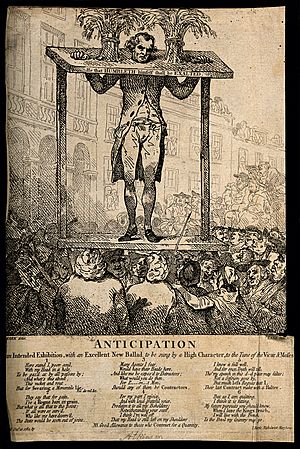Christopher Atkinson Saville facts for kids
Christopher Atkinson (born around 1738 – died April 23, 1819) was an English merchant and politician. After 1798, he became known as Christopher Atkinson Savile or Saville.
Born in Yorkshire, Christopher Atkinson later moved to London. There, he married the niece of a corn merchant. This led him to join the corn trade himself at the London Corn Exchange.
In the 1780 British general election, Atkinson was chosen as one of the two Members of Parliament for Hedon. However, he was removed from the House of Commons on December 4, 1783. This happened because he faced serious consequences for his business dealings with the Navy's supply board.
In 1791, Atkinson received a royal pardon, which meant his past issues were forgiven. He was then elected to Parliament for Hedon again in 1796. He held this position until he decided not to run in the 1806 election. Sometime after 1798, he changed his name to Savile.
He then bought many properties in Okehampton in Devon. These properties gave him control over both parliamentary seats in the area, known as a "pocket borough." In the 1807 election, he helped his son, Albany Savile (1783-1831), get elected. Christopher Atkinson himself was elected for Okehampton in the 1818 election. He held this seat until he passed away in April 1819, at over eighty years old.
Family Life
Christopher Atkinson had two wives. His first wife was Jane Constable. She was the daughter of John Constable and the aunt of the famous painter John Constable.
His second wife was Jane Savile. Their only son, Albany Savile, also became a Member of Parliament for Okehampton. He served from 1807 to 1820, even serving alongside his father for a short time. Albany Savile was the grandfather of Sir Leopold Halliday Savile.
Christopher Savile also had another son named Robert Farrand. Robert later became a Member of Parliament for Hedon and then for Stafford.
Connection to John Constable
In 1811, the diarist Joseph Farington wrote about a dinner with the painter John Constable. They talked about Christopher Atkinson Savile.
John Constable described Savile as someone who cared mostly about making money. Constable mentioned that Savile had faced public criticism for his business actions. However, Constable said that Savile seemed unaffected by such criticism. Constable also noted his own family connection to Savile, explaining that Savile had married a relative of his father. He added that Savile came from Yorkshire and built his business from the ground up, eventually taking over a corn merchant's business.
 | Kyle Baker |
 | Joseph Yoakum |
 | Laura Wheeler Waring |
 | Henry Ossawa Tanner |


